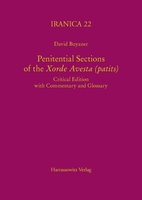|
weitere Titel zum Thema:
Download:
Bitte beachten Sie: Mit digitalen Produkten in Ihrem Warenkorb
wird die Bezahlung nur per PayPal möglich. Der Download dieser Produkte wird bereitgestellt, wenn die Bezahlung bestätigt ist. The Zand ī Xorde Awestā, the Pahlavi version of the compilation of Avestan liturgical texts with the traditional name “Small Avesta” (Xorde Awestā), is one of the main monuments of the corpus of Pahlavi translations and commentaries (called zand) of Avestan original texts. Since the Xorde Awestā and its Pahlavi version consist of a variety of heterogeneous texts which belong to different strata of Zoroastrian literature, they are not only sources of utmost importance for Avestan and Pahlavi philology, but also for the history of Zoroastrianism, and, especially in its penitential sections, for the reconstruction of Zoroastrian law. The recitals of repentance called Padēd ī pašēmānīh (“Penitentiary prayer for repentance”, in two versions) and Xwad padēd (“Penitentiary prayer for oneself”), which are the main focus of this project, are of great interest for the reconstruction of Zoroastrian jurisprudence, since they contain the most extensive enumeration of sins and offences, using the specific terminology of religious and criminal law. The semantic and etymological analysis of legal vocabulary is one of the most urgent desiderata of Iranian Studies. Two other significant problems in this context concern the date of the composition of the Xorde Awestā and the underlying principle of its compilation. An exact analysis of those sections of the Zand ī Xorde Awestā without a prototype in the Avestan original, such as the Padēd texts, which are also known in their Pāzand version (i.e. in Middle Persian written in the Avestan script), would shed light on the question as to why these compositions were included in a zand compilation and the problem of the origins of this unique source.
|
|||||||||||||||||||||||||||||||||||||||






